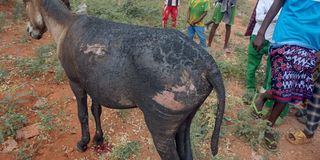
The use of a donkey cart to transport and carry out an improvised explosive device (IED) attack in Mandera last week has raised fears that the al-Shabaab terrorist group may be changing its tactics on attacks in the country.
The use of a donkey cart to transport and carry out an improvised explosive device (IED) attack in Mandera last week has raised fears that the al-Shabaab terrorist group may be changing its tactics on attacks in the country.
Police believe the militiamen planted the explosives on the donkey cart, targeting officers manning a roadblock on the Kenyan side of the Kenya-Somalia border in Mandera County.
The cart left Bula Hawa, Somalia, without detonating at the checkpoint manned by the Somali security officers, crossed the no man's land and entered the Kenyan side where it was deliberately diverted from the main road to a tree where some Kenyan officers were sheltering from the sun.
It was then detonated, killing one officer and seriously wounding four others.
“We believe they (attackers) were targeting our officers because the cart and its guide passed their (Somalia) checkpoint without detonating, only to do so after the rider diverted to where our officers were sitting under a shade and (the rider) jumped off the cart,” Mandera County Commissioner Amos Mariba told the Nation on Monday.
Kenyans reacted with shock to the attack, with some calling it unconventional and pointing to the need for continued vigilance and liaison with security agencies in the event of suspicious activity.
But for Mariba, the attack was typical behaviour by terrorists, replicating what has "succeeded" elsewhere to create maximum fear among their targets.
British army camp
Donkey-borne IEDs have been used by the Taliban in Afghanistan, where IEDs were placed on a donkey sent "galloping" towards a British army camp in 2009.
Masisi Kiilu, the Principal Liaison and Training Officer at Kenya's National Counter Terrorism Centre, explains that the use of donkey carts can be explained in two ways: as a means of transport and as a source of access to populated areas.
“Donkey carts are hardly ever inspected, hence they can be used to ferry the explosives, and [provide] access to populated areas or targets, and activated while still on the donkey cart,” he said.
In Iraq, the same strategy has been used to attack two hotels in Baghdad, a US-manned checkpoint and on a number of occasions in the West Bank and Gaza, including recently when Hamas rigged dolls with IEDs.

Police believe the militiamen planted the explosives on the donkey cart, targeting officers manning a roadblock on the Kenyan side of the Kenya-Somalia border in Mandera County.
The use of animal-borne IEDs is a form of animal cruelty that is punishable in several jurisdictions.
Animal cruelty
Studies show that animal cruelty is linked to terrorism when it is not done on impulse.
The United States Counter Terrorism Centre warns that reporting animal cruelty can help minimise acts of violence against people, including terrorism.
This is especially true when the cruel behaviour is premeditated.
Data from clinical and mass murder incidents, including terrorist attacks in the United States, show that the vast majority are premeditated.
“Although warning behaviours cannot predict targeted violence, they are useful in identifying an accelerated and increased risk of violence that should elevate authorities’ concern. Animal cruelty, particularly when premeditated in nature, is one example of novel aggression warning behaviour,” the United Nations National Counter Terrorism Centre (NCTC) states in its guide on possible warning behaviour for terrorists.
A 2016 study by the Federal Bureau of Investigations (FBI) of the criminal records of 259 adults arrested for animal cruelty between 2004 and 2009 found that the majority were later arrested for other crimes, including violence.
The following year, in 2017, a man arrested for stabbing his family's dog confessed that he had justified his actions with his religious views. Before stabbing the dog, he had posted its picture on social media and said it would die soon.
Pressure cooker bomb
Upon further investigation of his residence, it was determined that the person was planning to construct and use a pressure cooker bomb in New York City on behalf of the terrorist group ISIS, according to court documents.
The centre warns that the carcass and medical history of the animal can provide important clues to the level of aggression and cruelty of the suspect.
As terrorists continue to improvise ways of attacking innocent civilians, Kenyans have been urged to remain vigilant and not fall for tricks such as unverified job opportunities in Somalia to avoid falling prey to al Shabaab.
In Jilib town last week, the terrorist group carried out a public execution of seven militants, including Kenyans, for allegedly spying for the United States, Somalia and Kenya.
"Some Kenyan militants are looking for an exit strategy to return home before they face the same fate – public execution," said Counter Terrorism Policing KE on X.







